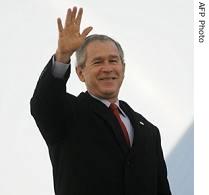2006年VOA标准英语-Talk about Talks with Iran and Syria(在线收听)
By Peter Fedynsky
Washington, DC
29 November 2006
watch Talks with Iran & Syria
President Bush's meeting with the Prime Minister of Iraq Nouri al-Maliki on Wednesday follows earlier talks in Tehran between the presidents of Iran and Iraq. As VOA's Peter Fedynsky reports, the politics of who talks with whom are controversial.

President George W. Bush, 27 Nov 2006
Violence in Iraq has prompted a series of recent crisis talks … and controversy about such talks.
Vice President Dick Cheney met on Saturday with King Abdullah in Saudi Arabia. But Steven Cook, a Middle East expert with the independent Council on Foreign Relations in New York questions the influence Saudi Arabia has in Iraq. "It makes tremendous sense to talk to the neighbors to see what kind of pressure, what kind of leverage they can bring to bear on the situation. But, we should be well aware that their ability to effect the situation on the ground may be as limited as ours is."
On Monday, Iraqi President Jalal Talabani conferred in Tehran with his Iranian counterpart, Mahmoud Ahmadinejad. Fareed Zakaria, the editor of Newsweek International Magazine, sees that meeting as an Iranian attempt to upstage the United States. "What Iran is saying to Iraq is, 'Look, if you want stability in your country, and you think we can help you, don't go through Washington, come directly to us.'"
The announcement of President Bush's meeting in Jordan on Wednesday with Iraqi Prime Minister Nouri al-Maliki prompted Shi'ite lawmakers associated with influential cleric Moqtada al-Sadr to threaten withdrawal from al-Maliki's coalition government.
Meanwhile, the New York Times newspaper reports that the Iraq Study Group, a bipartisan U.S. panel reviewing strategic options in Iraq, is likely to recommend direct talks between the United States, Iran and Syria. The Bush administration, however, has accused those countries of fueling the violence in Iraq.
President Bush has also linked any U.S.-Iranian talks to Tehran's alleged nuclear weapons program. "As far as the United States goes, Iran knows how to get to the table with us, and that is to do that which they said they would do, which is verifiably suspend their enrichment programs."
Iranian President Ahmadinejad accuses the United States of seeking to dominate the Middle East and its oil, and sets his own preconditions for talks with Washington. "The Iranian nation is ready to help you to get out of the quagmire on condition that you resume behaving in a just manner and avoid bullying and invading."
Robert Malley, a member of the National Security Council during the Clinton administration, says Iran and Syria have the ability to spoil any attempts to stabilize Iraq. He told a seminar at the United States Institute of Peace in Washington, D.C. that avoiding talks with those countries only promises more chaos. "The alternative, which is an alternative of talking to neighbors, with our clear red lines, but [also] listening to their interests and trying to see whether there is any overlap between what we're prepared to live with and what they're prepared to live with. That is, at this point, the only way forward in a situation that may in fact not have an easy cure for years to come."
Recommendations of the Iraq Study Group are expected in a final report to President Bush and Congress in December. Mr. Bush, however, is not bound by those recommendations and is expected to also consider studies by the Joint Chiefs of Staff and his National Security Council.